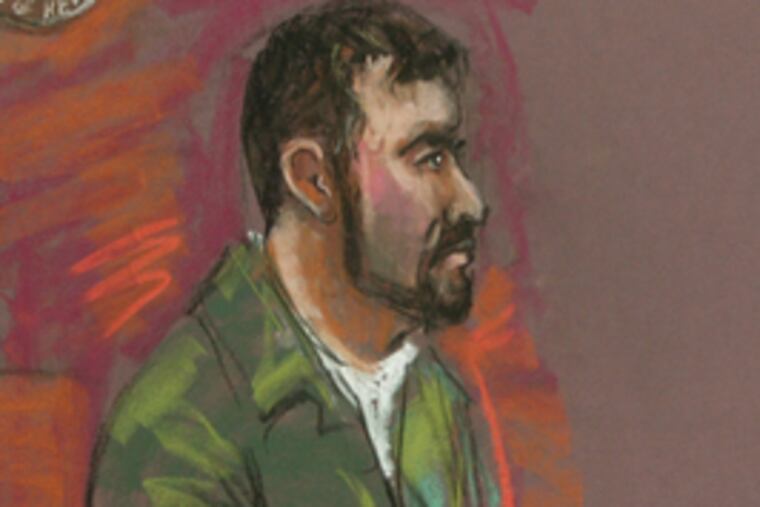TERROR SHOCK
Of all the mosques in the Philadelphia area, Al Aqsa Islamic Center was the last place one would expect to find "homegrown terrorists."

Of all the mosques in the Philadelphia area, Al Aqsa Islamic Center was the last place one would expect to find "homegrown terrorists."
Long before 9/11, the mosque and Islamic school, on Germantown Avenue at Jefferson Street, had been in the forefront of interfaith efforts to stop hate crimes.
Its leaders regularly work with city police, the FBI and other law-enforcement agencies.
In fact, Marwan Kreidie, 47, acting spokesman for Al Aqsa, thinks nothing of calling the FBI to advise them of something suspicious, or of helping a Muslim having a problem with a federal agency.
In other words, Al Aqsa is not a radical, Islamic fundamentalist hate-spewing mosque breeding terrorists.
Yet, four of the six defendants arrested Monday for conspiring to kill soldiers at Fort Dix, briefly prayed at the North Philadelphia mosque and the three Duka brothers - Eljvir, Shain and Dritan - even began to repair its roof at no cost.
About two months ago, Ibrahim Shnewer, 53, the father of the fourth defendant, Mohammed Ibrahim Shnewer, 22, was worried about a delay with his citizenship papers and asked if Al Aqsa could intervene with the feds.
"That told me . . . he didn't have a clue," what his son allegedly was planning , said Kreidie.
The elder Shnewer prayed regularly at the mosque, his son less frequently and the Duka brothers once or twice, according to Al Aqsa.
This week, the 1,000-member Al Aqsa community was in such shock that Imam Mohammed Shehata issued a statement:
"We have constantly urged our community members to report, either to us, or to law enforcement, any suspicious incidents. Had we noticed anything about these individuals that would have aroused suspicions, I can assure you, it would have been reported."
The FBI and Philadelphia Police confirmed they have worked with Kreidie, who is also executive director of the Arab American Development Corp.
After praying at the mosque yesterday, Mohammed Elsheikh, 31, a taxi driver by day and Widener University math student by night, said the defendants "are just going to make us [Muslims] look worse."
"They need to learn Islam," he added. "You have to start with yourself. You learn to be truthful.
"Only ignorance lets you do this," he added.
The colorfully painted Islamic Center, rehabbed from a furniture warehouse in the early 1990s, features Sunni sermons in Arabic with translation services. Its K-12 school has an enrollment of 200 students. And it houses a mortuary; a food store specializing in halal foods, which are ritually fit according to Islamic law; and an Arabic library.
Members of Mishkan Shalom, a reconstructionist synagogue in Manayunk, have worked closely with the mosque for years.
For the past three years, the Interfaith Walk for Peace and Reconciliation started at Al Aqsa before stopping at a Catholic church and then a synagogue in Center City. The upcoming June 3 walk will be in Germantown.
Meanwhile, in Staten Island, Ferid Bedrolli, an imam at the Albanian Islamic Cultural Center, said the Duka family had attended that mosque before moving to South Jersey.
Bedrolli said Dritan and his brothers belonged to an extended clan of 40 to 50 families, ethnic Albanians born in Debar, a remote town on Macedonia's rugged border with Serbia's Kosovo province.
Many had moved to the New York area, but some, like the Dukas, later relocated to Cherry Hill. The Duka brothers are illegal immigrants.
Dritan's wife, Jennifer Duka, 28, reportedly denied that her husband, a roofer, or his brothers, were involved in terrorist activities. "He prays. He never did anything violent. He gives money to charity," she told the New York Post.
Jennifer Duka couldn't be reached yesterday.
"Everybody knows them," Bedrolli said of the Dukas. "They lived in Brooklyn." But since moving to New Jersey, he said, he had seen them only infrequently.
"They are hard-working family," Bedrolli said. None of them ever gave any evidence that they were involved with Islamic radicals, he said.
"Even back home [in Albania and Macedonia]. I listen to the news [from overseas]. Every single person" is in disbelief, Bedrolli said.
"The U.S. is one of our best friends, the only country who really support us," during the ethnic-cleansing campaign of the Serbians during the 1990s.
"Fort Dix was a second home for the Kosovars."
Many families from Kosovo were brought to Fort Dix by the U.S. Agron Abdullahu, one of the six arrested in the terrorism plot, was among the Fort Dix refugees.
"We all have been supporters of America. We were always thankful to America for its support during the wars in Kosovo and Macedonia," a cousin, Elez Duka, 29, told the Associated Press in Debar. "These are simple, ordinary people, and they've got nothing to do with terrorism."
Ismail Badat, president of the Islamic Center in Palmyra, Burlington County, which the Duka brothers attended, said everyone there was dumbfounded.
"These were religious kids. They were hardworking boys. They were very friendly, well-behaved, well-mannered. There was nothing to indicate they were going off the path," he said.
"We don't talk about hatred at our mosque. We come to pray. Islam denounces terrorism." *